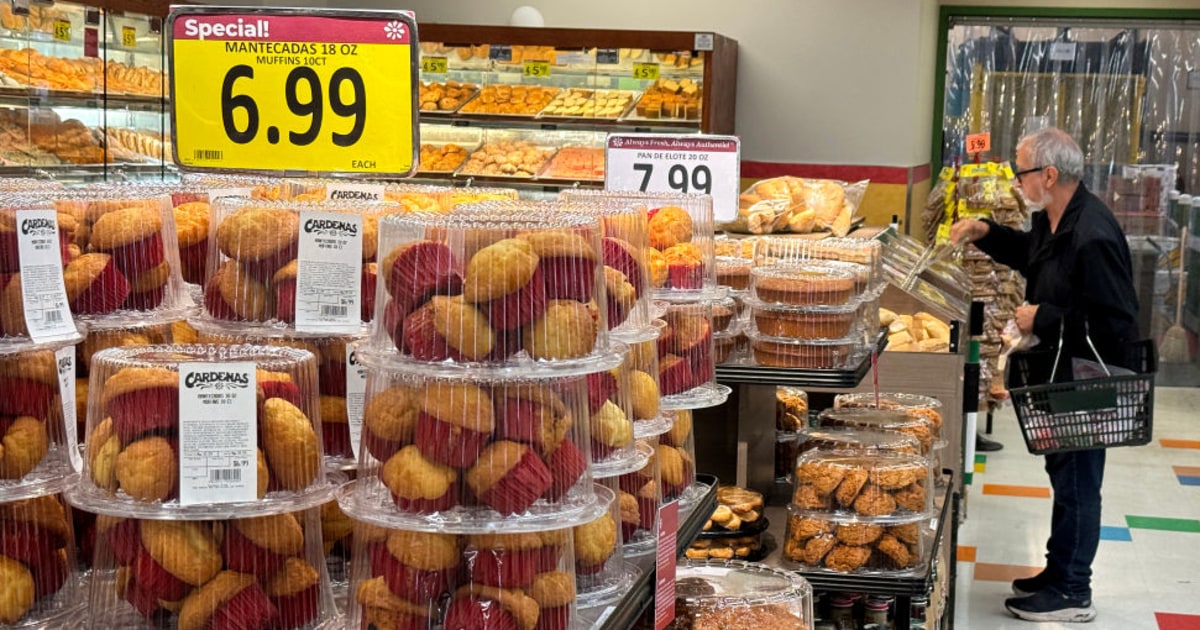By JJ McCorvey -
NBC News
What is the relationship of consumers with the economy these days?
Complicated.
Late last year, inflation appeared to be steadily declining, consumer confidence was soaring, and many Americans' wages were finally outpacing rising prices.
In the early months of 2024, those trends have been a little harder to see, at least on the surface.
[Eliminating the standard commission on home sales doesn't seem to benefit everyone]
The annual inflation rate has hovered above 3% for months, the latest retail sales data was weak and wholesale prices rose unexpectedly.
None of that has stirred markets much, where investors remain confident that the Federal Reserve will begin lowering interest rates this year, even if later than initially believed, a long-awaited sign that the Fed's crusade central bank against inflation is finally coming to a victorious end.
But we're not there yet, the Federal Reserve looks set to reinforce that message when it meets again next week to design a future plan.
Meanwhile, consumers continue to complain about persistently high prices on everything from houses to hamburgers.
This is what, according to economists, emerges from the latest batch of indicators and where they point in the coming weeks.
Higher gas prices
About two-thirds of the recent spike in wholesale inflation was due to rising commodity prices that federal economists attributed largely to higher energy prices.
This includes gasoline, which rose 6.8% on the wholesale market in February.
A customer shops at a supermarket in San Rafael, California.
Justin Sullivan/Getty Images
Experts consider it a normal seasonal trend.
Demand for gasoline increases with the entry into effect of daylight saving time and the arrival of the travel season.
Prices at the pump are already rising modestly, with a gallon of regular gasoline at nearly $3.44 on Friday, four cents higher than a week ago, and that's before more expensive summer gas has hit the pumps. , notes the AAA.
But energy markets continue to grapple with some uncertainty, including due to geopolitical factors such as the recent Ukrainian attacks on Russian refineries.
On Thursday, the International Energy Agency revised its outlook for the year, forecasting a slight supply shortfall that could drive up energy prices in the coming months.
According to some experts,
rising oil prices threaten to impact the cost of transporting goods
, which retailers could pass on to consumers.
[USA. records the highest average price of regular gasoline in the last three months]
"This could be a wild card," said Ted Rossman, industry analyst at Bankrate.
"If it suddenly costs 5% or 10% more to move goods, that could contribute to inflation."
With gas prices still a few cents from their level a year ago, other analysts are more optimistic.
Fuel prices are "very visible" to consumers and could weigh somewhat on spending, said Kayla Bruun, an economist at Morning Consult.
"But as long as the labor market remains strong, it's not something we should worry about," she said.
More cautious consumers
Still, new consumer confidence figures, released Friday, show customer opinions have stabilized after rising over the winter.
"Consumers perceived few signs of improvement or deterioration in the economy," the University of Michigan researchers wrote of the March data.
In this context,
many people are becoming more conservative about their spending
compared to a couple of years ago.
Early in the pandemic recovery, Americans' bank accounts were filled with savings and economic stimulus, and they flocked to restaurants and fueled a boom in travel.
Some of this still occurs but at a more cautious level, experts say.
Budget travelers have pulled back, while the wealthiest continue to shell out money as airlines chase high-end customers.
Retail sales rose 1.5% in February from the same month a year earlier, according to preliminary data released Thursday, but rose only 0.6% from January.
"When you take inflation into account, sales are down a little bit," Rossman said.
"A lot of people are saying, whether in words or even more so in actions, that maybe it's not the best time to do a big renovation at home or buy a new TV," he said.
[Why are so many voters frustrated by the American economy? the key is in housing prices]
American wage growth remains above pre-pandemic rates, and unemployment remains below 4%, despite rising last month.
But the persistent rise in prices is eating into consumers' incomes, even as inflation slows and some brands finally begin to moderate their price increases.
"People spend because they have to, not because they necessarily want to
," Rossman added.
An optimistic forecast
Although the signs seem contradictory at the moment, experts are optimistic that the economy is on the right track.
What happens next "will depend a lot on the path of the Federal Reserve's interest rates in the last six months of the year," said Tuan Nguyen, a US economist at accounting and consulting firm RSM.
However, RSM has already updated its forecast that inflation will reach 2% by mid-year, a more optimistic estimate than the previous one, based in part on "encouraging" retail trade figures, Nguyen said.
The Federal Reserve has set the inflation rate at 2%, which it considers favorable, but not too restrictive, for economic growth.
Rossman noted that this year's economic data "reflects a slow-growing economy, but one that continues to grow."
This could boost the Fed's confidence that it can keep rates "higher for longer" to address inflation without causing much collateral damage elsewhere, he said.
At the same time, Rossman noted that rising credit card debt remains a key factor in Americans' views on the economy in the coming months.
"I think it depends a lot on where you fall on that spectrum, whether you're in the 44% of Americans with credit card debt," he said.
"If so, those rates are at historic highs, and it's a very heavy burden."

